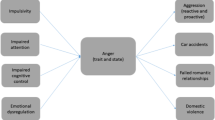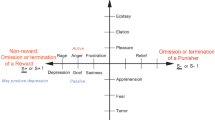Abstract
The prefrontal cortex is deputed to higher functions, such as behavior and personality. It includes three regions: ventromedial, orbitofrontal, and dorsolateral. Each of them has a function. Devising, programming, and planning are all conditions related to the dorsolateral cortex, also responsible for rational content and decision. Damage to this region results in apathetic syndrome, a condition that causes loss of interest, initiative, and attention, and in the most severe cases leads to a lethargic state. It is also known as a form of secondary depression, the so-called pseudo-depression syndrome, according to Karl Kleist or apathetic-abulic-akinetic syndrome, according to Alexander Luria. The prefrontal dorsolateral syndrome is responsible for the reduction or abolition of free will. Free will is an expression of individual freedom. It allows the human being to have and express own opinions as well as to respect those of others. Free will is related to moral sense, a binomial which directs the individual towards a proper social conduct. In this review, we describe the effects of the pseudo-depression syndrome on free will, of which we treat both the anatomical site and the social aspect.
Similar content being viewed by others
References
Berthoz, S., Grezes, J., Armony, J. L., Passingham, R. E., & Dolan, R. J. (2006). Affective response to one’s own moral violations. Neuroimage, 31, 945–950.
Blumer, D. (1970). Neurological states masquerading as psychoses. Maryland State Medical Journal, 19(10), 55–60.
Ciaramelli, E., Muccioli, M., Ladavas, E., & di Pellegrino, G. (2007). Selective deficit in personal moral judgment following damage to ventromedial prefrontal cortex. Social Cognitive and Affective Neuroscience, 2, 84–92.
D’Argembeau, A., Xue, G., Lu, Z. L., Van der Linden, M., & Bechara, A. (2008). Neural correlates of envisioning emotional events in the near and far future. Neuroimage, 40, 398–407.
Damasio, A. R. (1994). Descartes’ error: emotion, reason, and the human brain. New York: Putnam.
Darby, R. R., Joutsa, J., Burke, M. J., & Fox, M. D. (2018). Lesion network localization of free will. Proceedings of the National Academy of Sciences of the United States of America, 115(42), 10792–10797. https://doi.org/10.1073/pnas.1814117115.
De Waal, F. B. (2005). How animals do business. Scientific American, 292, 54–61.
Fasullo, S. (1971). The moriatic syndrome. Acta Neurol (Napoli)., 26(5), 614–632.
Filevich, E., Vanneste, P., Brass, M., Fias, W., Haggard, P., & Kühn, S. (2013). Brain correlates of subjective freedom of choice. Consciousness and Cognition, 22(4), 1271–1284. https://doi.org/10.1016/j.concog.2013.08.011.
Fiske, A. P. (2002). Moral emotions provide the self-control needed to sustain social relationships. Self and Identity, 1, 169–175.
Glozman, J. M. (2007). A.R. Luria and the history of Russian neuropsychology. Journal of the History of the Neurosciences, 16(1–2), 168–180.
Greene, J. D., Sommerville, R. B., Nystrom, L. E., Darley, J. M., & Cohen, J. D. (2001). An fMRI investigation of emotional engagement in moral judgment. Science., 293, 2105–2108.
Greene, J. D., Nystrom, L. E., Engell, A. D., Darley, J. M., & Cohen, J. D. (2004). The neural bases of cognitive conflict and control in moral judgment. Neuron, 44, 389–400.
Haggard, P. (2008). Human volition: towards a neuroscience of will. Nature Reviews. Neuroscience, 9(12), 934–946. https://doi.org/10.1038/nrn2497.
Haidt, J. (2001). The emotional dog and its rational tail: a social intuitionist approach to moral judgment. Psychological Review, 108, 814–834.
Haidt, J. (2007). The new synthesis in moral psychology. Science, 316, 998–1002.
Hallett, M. (2016). Physiology of free will. Annals of Neurology, 80(1), 5–12. https://doi.org/10.1002/ana.24657.
Hause, M. D., Cushman, F. A., & Young, L. L. (2006). A dissociation between moral judgments and justifications. Minde Languag., 22, 1–21.
Hauser, M. D. (2006). Moral minds: how nature designed our universal sense of right and wrong. New York: Ecco/Harper Collins.
Heekeren, H. R., Wartenburger, I., Schmidt, H., Schwintowski, H. P., & Villringer, A. (2003). An fMRI study of simple ethical decision-making. Neuroreport, 14, 1215–1219.
Kleist, K. (1952). Brain and psyche. The Journal of Nervous and Mental Disease, 116(6), 776–782.
Koenigs, M., Young, L., Adolphs, R., Tranel, D., Cushman, F., Hauser, M., & Damasio, A. (2007). Damage to the prefrontal cortex increases utilitarian moral judgments. Nature., 446, 908–911.
Lieberman, M. D. (2007). Social cognitive neuroscience: a review of core processes. Annual Review of Psychology, 58, 259–289.
Moise, D., & Madhusoodanan, S. (2006). Psychiatric symptoms associated with brain tumors: a clinical enigma. CNS Spectrums, 11, 28–31.
Moll, J., & Schulkin, J. (2009). Social attachment and aversion in human moral cognition. Neuroscience and Biobehavioral Reviews, 33, 456–465.
Moll, J., Oliveira-Souza, R., Eslinger, P. J., et al. (2002). The neural correlates of moral sensitivity: a functional magnetic resonance imaging investigation of basic and moral emotions. The Journal of Neuroscience, 22, 2730–2736.
Moll, J., de Oliveira-Souza, R., & Eslinger, P. J. (2003). Morals and the human brain: a working model. Neuroreport, 14, 299–305.
Monroe AE, Dillon KD, Malle BF. Bringing free will down to Earth: people’s psychological concept of free will and its role in moral judgment. Consciousness and Cognition 2014;27:100–108. https://doi.org/10.1016/j.concog.2014.04.011. Epub 2014 May 20.
Neumärker, K. J., & Bartsch, A. J. (2003). Karl Kleist (1879–1960)—a pioneer of neuropsychiatry. Hist Psychiatry, 14(56 Pt 4), 411–458.
Oreskovic, N. M., Strother, C. G., & Zibners, L. M. (2007). An unusual case of a central nervous system tumor presenting as a chief complaint of depression. Pediatric Emergency Care, 23, 486–488.
Ozdilek, B., & Midi, L. (2011). Brain tumor presenting with psychiatric symptoms. Journal of Neuropsychiatry and Clinical Neurosciences, 23, E43–E44.
Queralt, M., Alegre, J., Suriñach, J. M., & de Sevilla, F. (1993). Frontal tumor and mental deterioration. Revista Clínica Española, 193(4), 185–186.
Rothbart, M. K., & Derryberry, D. (1981). Development of individual differences in temperament. In M. E. Lamb & A. Brown (Eds.), Advances in developmental psychology, Vol. 1 (pp. 37–86). Hillsdale: Erlbaum.
Rothbart, M. K., & Posner, M. I. (1985). Temperament and the development of self-regulation. In L. H. Hartlage & C. F. Telzrow (Eds.), Neuropsychology of individual differences: a developmental perspective (pp. 93–124). New York: Plenum.
Rothbart, M. K., Ziaie, H., & O’Boyle, C. G. (1992). Self-regulation and emotion in infancy. New Directions for Child Development, (55), 7–23.
Schaich Borg, J., Hynes, C., Van Horn, J., Grafton, S., & Sinnott-Armstrong, W. (2006). Consequences, action, and intention as factors in moral judgments: an FMRI investigation. Journal of Cognitive Neuroscience, 18, 803–817.
Signorelli, F., Ruggeri, F., Iofrida, G., Isnard, J., Chirchiglia, D., Lavano, A., Volpentesta, G., Signorelli, C. D., & Guyotat, J. S. (2007). Indications and limits of intraoperative cortico-subcortical mapping in brain tumor, surgery: an analisys of 101 consecutive cases. Journal of Neurosurgical Sciences, 51(3), 113–127.
Signorelli F., Chirchiglia D., Maduri R. . Surgical resections of tumor infiltrating left insula and perisylvian opercula-utility of anatomic landmarks implemented by intraoperative functional brain mapping, Intech 2013.
Tangney, J. P., Stuewig, J., & Mashek, D. J. (2007). Mirror neuron system: basic findings and clinical applications. Annals of Neurology, 62, 213–218.
Vohs, K. D., & Schooler, J. W. (2008). The value of believing in free will: encouraging a belief in determinism increases cheating. Psychological Science, 19(1), 49–54. https://doi.org/10.1111/j.1467-9280.2008.02045.x.
Wilson, J. Q. (1995). The moral sense. New York: Simon & Schuster.
Author information
Authors and Affiliations
Corresponding author
Ethics declarations
Conflict of Interest
The authors declare that they have no conflicts of interest.
Additional information
Publisher’s Note
Springer Nature remains neutral with regard to jurisdictional claims in published maps and institutional affiliations.
Rights and permissions
About this article
Cite this article
Chirchiglia, D., Chirchiglia, P., Marotta, R. et al. The Dorsolateral Prefrontal Cortex, the Apathetic Syndrome, and Free Will. Act Nerv Super 61, 136–141 (2019). https://doi.org/10.1007/s41470-019-00057-w
Received:
Revised:
Accepted:
Published:
Issue Date:
DOI: https://doi.org/10.1007/s41470-019-00057-w




